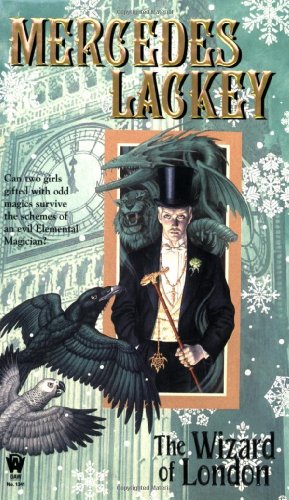
![]() The Wizard of London by Mercedes Lackey
The Wizard of London by Mercedes Lackey
The Wizard of London is the fifth of Mercedes Lackey’s stand-alone novels in her ELEMENTAL MASTERS series of fairytale retellings. It’s so loosely based on Hans Christian Andersen’s “The Snow Queen” that you probably won’t even notice the few similarities. There’s an ice queen, but the theme of The Wizard of London (if there is one, which I doubt), has nothing to do with the theme of “The Snow Queen.”
The story starts when a little girl named Sarah arrives from Africa (where her parents are missionaries) at a London boarding school that is known to educate and train the children of Elemental mages. There she finds an ethically and religiously diverse cast of excellent teachers and attendants. She also befriends a young street urchin named Nan whose mother is a neglectful drug addict. Together Sarah and Nan have various girlish adventures such as acting in plays, doing chores and school projects, visiting the country, solving little mysteries, acquiring avian familiars, practicing some magic, and producing a version of A Midsummer Night’s Dream (a big nod to Rudyard Kipling’s Puck of Pook’s Hill here). Their headmistress, Isabelle, often has special tasks for them such as attending a séance to help debunk the local medium.
Eventually the story gets on with it and we meet the “Ice Queen.” She is Cordelia, an Elemental mage who mentors David, the man who suddenly dumped Isabelle (the headmistress) without explanation years ago. Gradually we learn that Cordelia made a deal with an ice elemental and has certain disturbing magical skills that she uses to try to gain power over others, especially David. When she’s not doing evil stuff, she is lamenting the fact that she’s a woman and, therefore, forced to gain her power in such an unethical way.
The Wizard of London is marketed to adults, but a lot of the time it feels like a children’s story since it frequently focuses on the two girls and is often simple and told in short cute episodes that end with the girls being praised for being nice, smart or brave. These parts of the story are quite sweet and childish. But then, as she does in every ELEMENTAL MASTERS book that I’ve read so far, Lackey throws in that super evil villain that reminds you that you’re not reading a children’s book. The story flip-flops between these two tones — sickly sweet and pathologically violent — and also can’t seem to settle on a particular main character or story line. It jumps around all over the place. The disparate plot elements are also strangely jumbled. They don’t feel like they go together organically or fit into the story of “The Snow Queen.” I think I would have left out Robin Goodfellow, the Morrigan, the Wild Hunt, and Aleister Crowley completely, and I won’t even mention the weird part where the headmistress (quite the proper lady) shows up garbed in merely a scrap of chemise and wielding a spear. That was really odd. It also seems to me that Lackey keeps changing the rules to her elemental magic system. It’s never consistent.
As usual, all the protagonists are unfailingly wonderful all the time. They’re smart, they’re nice, they’re brave, and all of their ideas are correctly 21st century American even though they live in Victorian England (all of Lackey’s ELEMENTAL MASTERS protagonists are like this). The villains, or course, are all on par with Jeffrey Dahmer and Ted Bundy.
Michelle Ford does the narration for Audible Studio’s version of The Wizard of London. Her voices are wonderful, but she has a few mispronunciations, including twice mispronouncing the word “sidhe” which she pronounces as “seed-hay” even after Nan misunderstands it as “she” and has to be told that how it’s spelled.



Aleister Crowley is just a warlock too far, in my opinion.
Kat, even without reading the book I am sure that the headmistress had just nodded off to sleep, after reading a few psalms from a fifteenth century hymnal, when she was awakened by something and only had time to leap out of bad and snatch up the Spear of Destiny which she kept by her bed for safekeeping. Isn’t that what usually happens? I’m sure she was wearing a chemise only because it was summer and too hot for flannel.
She keeps bringing up Aleister Crowley in these books, but she does nothing with him, which is really disappointing.
You’re probably right about the chemise. Except she was with two male characters who had suddenly turned into warriors and were dressed in armor. I think she should have been wearing armor, too. Way more practical.
Definitely more practical!